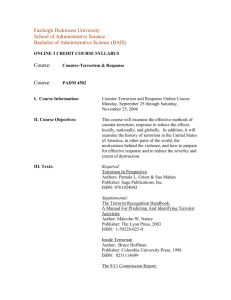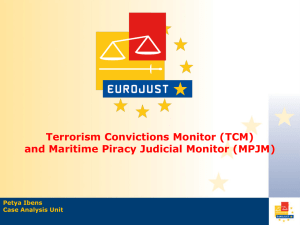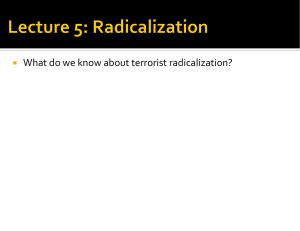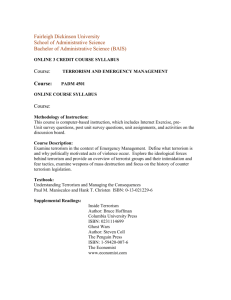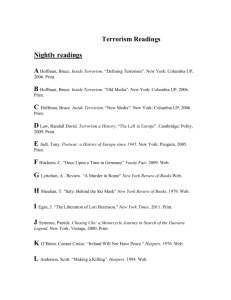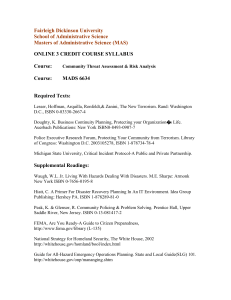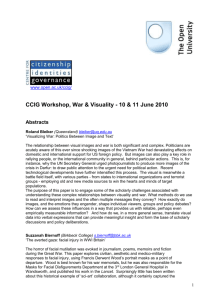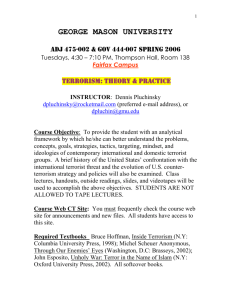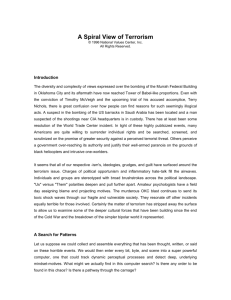Over the past century, nations worldwide have witnessed an
advertisement
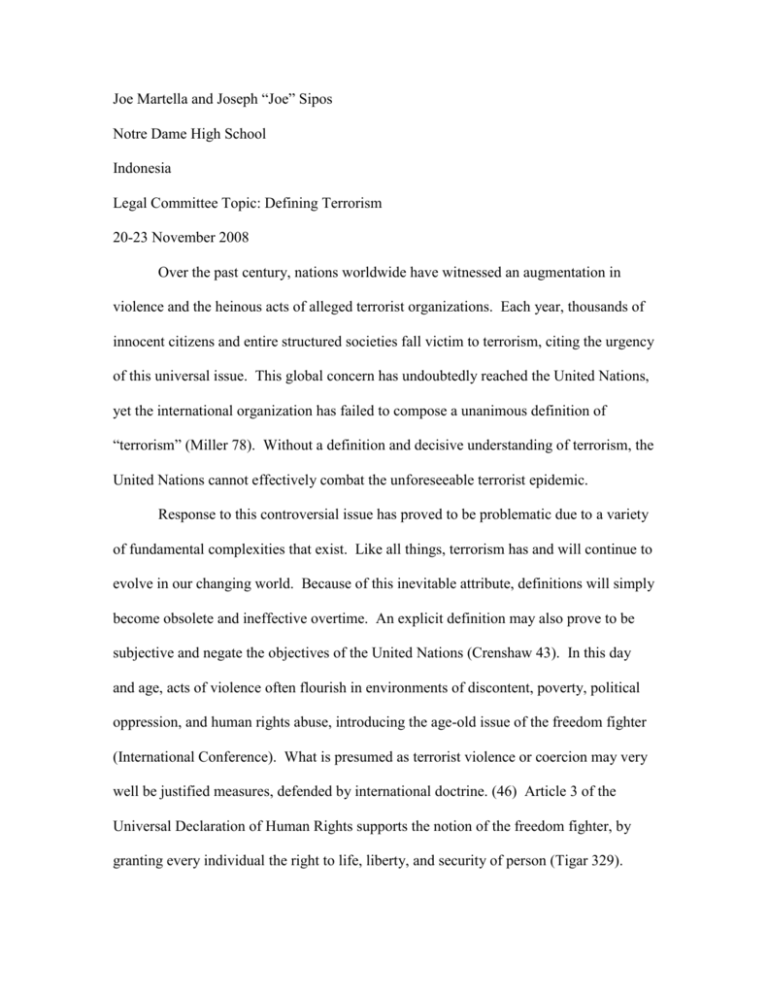
Joe Martella and Joseph “Joe” Sipos Notre Dame High School Indonesia Legal Committee Topic: Defining Terrorism 20-23 November 2008 Over the past century, nations worldwide have witnessed an augmentation in violence and the heinous acts of alleged terrorist organizations. Each year, thousands of innocent citizens and entire structured societies fall victim to terrorism, citing the urgency of this universal issue. This global concern has undoubtedly reached the United Nations, yet the international organization has failed to compose a unanimous definition of “terrorism” (Miller 78). Without a definition and decisive understanding of terrorism, the United Nations cannot effectively combat the unforeseeable terrorist epidemic. Response to this controversial issue has proved to be problematic due to a variety of fundamental complexities that exist. Like all things, terrorism has and will continue to evolve in our changing world. Because of this inevitable attribute, definitions will simply become obsolete and ineffective overtime. An explicit definition may also prove to be subjective and negate the objectives of the United Nations (Crenshaw 43). In this day and age, acts of violence often flourish in environments of discontent, poverty, political oppression, and human rights abuse, introducing the age-old issue of the freedom fighter (International Conference). What is presumed as terrorist violence or coercion may very well be justified measures, defended by international doctrine. (46) Article 3 of the Universal Declaration of Human Rights supports the notion of the freedom fighter, by granting every individual the right to life, liberty, and security of person (Tigar 329). Seeing this, the Republic of Indonesia recommends that the United Nations consider the plight of oppressed individuals as it continues its campaign against terrorist ambitions. The United Nations should develop a subcommittee within the Legal Committee to pass judgment on the aspirations of presumed terrorist and radical organizations (Miller 54). If it is determined that an individual or organization committed obvious acts of violence with the intent of simply hurting others, it will be seen that criminal prosecution is employed. This subcommittee would also ensure that the term freedom fighter is not exploited. The motives of these organizations would have to be in accordance with United Nations policy and be deemed as worthy avocations of reform. Upon doing so, the United Nations will be better equipped to discern the motives of repressive terrorists and those of genuine freedom fighters Most importantly, it is important that a general definition is drafted that recognizes the malicious motives of blatantly terrorist groups. As former Attorney General Ramsey Clark once noted, “One person’s terrorist is another person’s freedom fighter.” However much one would like to support the goals of freedom fighters, certain practices are simply barbaric, and would be deemed as a definite terrorist activity, among others that would not be sanctioned by the United Nations, as determined by a subcommittee. As former Attorney General Ramsey Clark once noted, “One person’s terrorist is another person’s freedom fighter” (McGraw). Despite the fact that the United Nations already has a plan in place to combat terrorism, how efficient can it be if there is no definition of terrorism officially recognized? Terrorism is ever-changing. The term changes meaning more times than not. The definition agreed upon by this committee will be one that has to change as well. While violent conflicts have been characteristic of the human race throughout history, a recent emphasis has been placed on interpreting these acts of violence as either warfare, terrorism, or freedom fighting. While some argue that any intimidating or violent act against a group of people is terrorism, modern conditions like environments of discontent, exclusion, humiliation, poverty, political oppression, human rights abuse, and regional conflicts reflect the more complicated matter that is at hand. In the face of oppression and tyranny, individuals should have the right to rise against their oppressors, even if it requires violent means. The importance is to differentiate between a genuine freedom fighting cause, and a blatant terrorist act of intimidation and coercion. Works Cited Crenshaw, Martha. Terrorism and International Cooperation. New York: Institute for East-West Security Studies, Inc., 1989. Higgins, Rosalyn, ed. Terrorism and International Law. New York: Routledge, 1997. Miller, Seumas. Terrorism and Counter-Terrorism Ethics and Liberal Democracy. Malden: Blackwell Publishing, 2009. Tigar, Michael E. Thinking About Terrorism. Chicago: American Bar Association, 2007.

